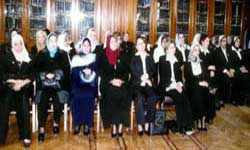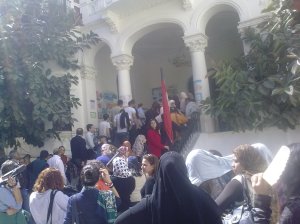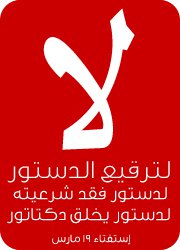لقراءة هذا الموضوع باللغة العربية، اضغط هنا.
The 1971 constitution is (or should I say was?!) viewing women from a pure patriarchal perspective. Although several articles prohibit discrimination on the basis of sex, religion, race, etc but they remain just a theory.
Article 1 is about citizenship, but women never enjoyed full citizenship rights in Egypt, they are always treated as second rank citizens. Article 40 is also about equality before the law, yet what does equality mean here when lots of laws are discriminatory against women, including articles in the penal code on punishment of adultery and passion crimes. Furthermore, in prostitution cases, men are being held as witnesses then released, while women are being charged and prosecuted. There is also an article in the penal code that allows judges to issue a linient sentence for those who committed honor killings, and so they are not treated as perpetrators of murder. Also women and men are not equal when it comes to the right of divorce. Men can divorce their wives with a simple word, while women have to resort to courts.
Although article 8 has affirmed the principle of equal opportunities for all Egyptian citizens, but we find women are still subjected to discrimination. There are certain jobs they are not allowed to occupy, like judiciary and public prosecution. Women are not allowed to occupy positions in State Council. On Monday February 15th, 2010, in State Council’s General Assembly meeting, 334 MALE judges voted against the appointment of females to judicial posts. Conservative judges’ arguments, are always related to Islam. The constitution unfortunately allows for religion to be a main factor in discrimination against women. For example article 2 of the Egyptian constitution [ Islam as being the state religion] and article 11. [The State shall guarantee coordination between woman’s duties towards her family and her work in the society, considering her equal to man in the political, social, cultural and economic spheres without detriment to the rules of Islamic jurisprudence (Sharia)]. Who decides the principles of Sharia? Those conservative judges did, and so did other sheiks. They claimed to know what exactly Islamic jurisprudence is and for them it says that women are not capable of and shouldn’t be allowed to hold certain positions. One of the prominent judges actually stated that women’s primary role is in their homes taking care of their children and husbands. Perhaps we should be less surprised, considering that article 10 in the constitution emphasizes the traditional role of women as mothers. It brings that that the state shall guarantee the protection of motherhood and childhood! I wished to see an article that openly emphasizes that women and men are equal when it comes to labor rights and that they are both partners in the development of this country!

Even ordinary Egyptians who keep listening to this discriminative discourse all the way, on the radio and TV, in mosques, in schools and universities, started to believe that Islam limits the participation of women in certain positions! Even if this is true, even if Islam is discriminatory against women, this shouldn’t be allowed in a state that believes in citizenship, according to article 1 in its constitution! The constitution in its current form is disastrous and if this is not avoided in the new constitution, we will still be stuck in reverse.
Add to that article 62, which allows having quota for women in the parliament. Quota has done nothing to women but segregation! Under the former regime, – I am not sure if I should call it former already!!- this quota was used to guarantee a bigger representation for the NDP, the ruling party, in the parliament! All quota MPs after the 2010 elections were NDP members! The quota law was also very weird. It is a first in history ( correct me if I am wrong) to formulate a quota law that adds new seats to the parliament ordinary seats. The Egyptian parliament has 444 seats for 222 constituencies, in addition to other 10 appointed MPs. The quota law didn’t define women’s seats from those 444 seats, it added whole new 60 seats. The total number of MPs turned out to be 504 + 10 appointed MPs. If the main reason to have quota is for people to know and trust women leadership and their ‘ability’ to represent them in the parliament (the thing I think doesn’t need to be proved!!), then why weren’t the seats taken from the original 444 seats? It gives the impression that women are even more segregated and require a special treatment to the extent of adding new seats, because they can’t take part in the parliament with its ordinary formation.

Even in a democratic society, quota reinforces gender roles! There is no such thing as gender differences, but quota is reinforcing this. I know CEDAW is in favor of quota, but I think we should tackle the problem of under-representation of women in our country with a different approach. If you are not different, don’t go and ask for a law that shows you are different and need a special treatment! Actually this law makes the society angry with the whole women’s rights movement. Call for equality by taking to streets and having a voice! By building grass root women leaders, not by imposing it on society by law!
The newly passed constitutional amendments

The process of amending the constitution generally was wrong. We made a revolution. Revolutions make constitutions fall along with all the regime! Maybe the problem is that the regime didn’t fully fall. What happened is a big joke. Before the referendum, we took to streets and distributed fliers and talked with people not only to convince them that the amendments are discriminative and violate the principle of citizenship rights and equality between all Egyptians, but also to say that the whole referendum thing is not correct. As the Higher Council for Armed Forces, I don’t have to go and ask the people if they still want the constitution from which they suffered for the past 40 years!
The amendments had some odd criteria for presidency candidates, including that candidates shouldn’t be married to foreigners. English language is a bless, unless you add the words male/female to the sentence, you’ll never know whether it is a male or a female one is talking about. It is a gender-sensitive language by default, where this is not the case in Arabic. The formulation of the amended article suggests that only a male can run for president in Egypt, because he shouldn’t be married to a “foreign wife”. Article 75 in the 1971 constitution, was way better before amendment, at least it used a gender-neutral language!
Unfortunately the amendments passed, which is dangerous to the revolution as a whole, not to certain groups who were discriminated against like women and Egyptians married to foreigners.
The committee drafting the amendments didn’t have one woman as a member. I personally think that the exclusion of women from the so-called constitutional and legal experts’ elite circle, the ones who the state always refer to for drafting new legislations, was for long the main reason for discriminative legislations. The honorable committee members didn’t even think that an Egyptian woman can run for president! They didn’t offer an explanation or an excuse for that! I can imagine what they were to say if any of them had the courtesy to justify it. I can picture them saying that the article with its current formulation was meant to be general and that the default in Arabic language is the male pronoun (which I think is nonsense). Maybe practically speaking, this won’t affect women on the short run, because there might not be a woman candidate on the scene that can run for president for the upcoming elections. But on the long run, it affects the whole view to women as human beings with full citizenship. There will be a new constitution shortly after the upcoming parliamentary elections. Following that, a lot of work on law reform needs to be done. If the new constitution and the law reform processes didn’t take place on the basis of equality between men and women, it will be a huge problem. We are building our new state and we don’t want it to end up being another Iran.
Building a new state while committing the same mistakes is not doing any good for the society. What we need to have as a society- and not just the women ’s rights movement- is to have a clear alternative and a clear vision of what the women’s position in the new state will be, starting from the constitution: women as mothers and wives or women as citizens in this country. It is our historical opportunity and we shouldn’t waste it! Egyptian women and men made the January revolution, with no difference whatsoever in the roles they played. Being treated as equal in all aspects of life in the new Egypt is not negotiable.
